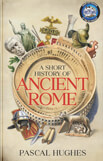Noiser
Albert Einstein and the World’s Most Famous Equation
Play Short History Of... Albert Einstein
Albert Einstein is one of the most celebrated scientists in history. His name is synonymous with discovery and invention. But who was the man behind the incredible mind and the famously messy hair? 
Early Life
Albert Einstein was born in Ulm, Germany, on March 14th, 1879. At school, he showed an exceptional talent for mathematics. But he didn’t excel in every subject, especially those that didn’t interest him, like literature and Greek. In fact, his Greek teacher famously told him that he would never amount to anything.
In 1896, Einstein attended the Zurich Polytechnic in Switzerland. Here, he met peers with equally scientific minds, including his wife-to-be, Serbian mathematician and physicist Mileva Marić. When Einstein graduated in 1900, his poor grades meant he came near the bottom of the class. This, coupled with his prickly attitude, meant he was unable to secure an academic posting.
There weren't many jobs for physicists. Plus, he had mouthed off to some of his teachers, and they did not write him letters of recommendation.
David Bodanis, author of Einstein’s Greatest Mistake
In 1902, Einstein worked as a clerk at the Swiss Patent Office in Bern. A year later, he married Mileva. While his domestic life was going well, his professional life was not. Time was running out to forge a career as a physicist.
Miracle Year
In 1905, everything changed. Seemingly from nowhere, Einstein published a string of landmark papers in the well-respected German journal Annalen der Physik. One focused on the properties of light, another on the existence of atoms and molecules. In his most famous paper of the year, Einstein introduced the Special Theory of Relativity, which fundamentally altered our understanding of space and time. The theory explained how speed, mass, time, and space are all interrelated.
Despite this considerable breakthrough, Einstein wasn’t done! A final paper emerged that included, perhaps, the most famous equation in history: E=mc².
This equation demonstrated the equivalence of mass and energy, suggesting that a small amount of mass could be converted into a tremendous amount of energy. This principle would later underpin the development of nuclear energy and atomic weapons.
1905 would become known as Einstein’s miracle year. But life did not change overnight for him. Other scientists were slow to catch on. For many in the scientific community, the doubt he cast on Newtonian physics was too much to process. But after a few more years in the patent office, people started to take notice.
Some of the top scientists in Germany thought, “This is really interesting.” By 1907, Einstein got a teaching job at university.
David Bodanis, author of Einstein’s Greatest Mistake
The General Theory of Relativity
While Einstein's special theory of relativity was revolutionary, he was not content to stop there. Over the next decade, he expanded his theory to include gravity, culminating in the publication of the general theory of relativity in 1915. This theory predicted that light would bend around massive objects, a phenomenon known as gravitational lensing. Einstein’s prediction was confirmed in 1919 during a solar eclipse by the English astronomer, Arthur Eddington. The story was quickly picked up by the media, and almost overnight, Einstein became an international superstar.
Nobel Prize
Following this breakthrough, pressure grew to award Einstein a Nobel Prize. However, there were questions about whether the theory of relativity even qualified. Nobel Prizes were traditionally awarded for ‘discoveries or inventions.’ Einstein’s opponents argued that he had done neither and had merely proposed a theory.
But, by 1922, most of the Nobel committee saw that they would lose all credibility if they failed to recognise him. Ultimately, he got his prize, but not for his work on relativity. Instead, it was for his important (but much less celebrated) work on the photoelectric effect, the first of his 1905 papers.
E=mc2 and the Atomic Bomb
In 1914, Einstein returned to Germany to accept prestigious academic positions in Berlin. As the political climate in Europe darkened over the following years, he emerged as a fierce opponent of fascism. His scientific renown gave him a powerful platform, which he used to speak out against the rising tide of authoritarianism and antisemitism in his homeland.
Einstein was a target in Germany in the 1920s. There were a number of cranks and fools saying that this was Jewish science and it was all wrong.
David Bodanis, author of Einstein’s Greatest Mistake
When Hitler came to power in 1933, Einstein was visiting the United States and chose not to return to his homeland. While in the States, he held the position of Professor of Theoretical Physics at the Institute for Advanced Study in Princeton, New Jersey. But there were more challenges on the horizon - namely, the development of a nuclear bomb, which his famous E=mc² equation paved the way for.
As a pacifist, Einstein opposed war. But, as an academic and a realist, he knew it was almost unavoidable. In 1939, he signed a letter to American President Franklin D. Roosevelt, stating that the US should take steps to stockpile uranium and progress its atomic bomb development to counter the Nazi threat.
Within two years, the White House had established the Manhattan Project to develop the weapon.
His role in the A-bomb’s development, however small, haunted him. Reflecting on the news that the USA had dropped atomic bombs on the Japanese cities of Hiroshima and Nagasaki in August 1945, Einstein said: ‘I made one great mistake in my life – when I signed that letter to President Roosevelt recommending that atom bombs be made… ‘
Death and Legacy
Albert Einstein died in Princeton, New Jersey, on April 18, 1955, at 76 years old. In 1999, Time Magazine named Einstein its Person of the Century, stating that he serves as a ‘symbol of all the scientists’.
